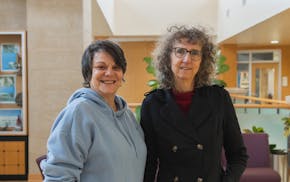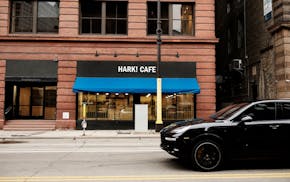Some of the biggest buzz makers at last month's South by Southwest Music Conference weren't musicians trying to break through to a national audience. They were artists simply worried about getting into the country.
Performers from Iran and Egypt and even an Italian band named Soviet Soviet were all missing from SXSW because they were denied entry into the United States by customs officials. SXSW itself took a big public relations hit when a musician cried foul over fine-print legal language in its contracts, which threatened to report foreign bands to immigration authorities if they don't play by the rules (language that has never actually been enforced).
In the end, SXSW reiterated its commitment to promoting international artists. Two of the more widely publicized events at this year's conference were a concert and discussion panel dubbed "Contrabanned," each featuring musicians from the six Muslim-dominant countries singled out in the Trump administration's new travel ban, including Somalia, Syria, Iran and Libya.
"I'm just so sick of this stigma," said "Contrabanned" artist Siham Hashi of the Somali Canadian duo Faarrow, which is currently recording in Los Angeles for Warner Bros. She has avoided traveling home to Toronto simply because her passport says "born in Somalia."
"It's not worth the hassle right now," Hashi said.
The same week as SXSW, the staff at the Cedar Cultural Center in Minneapolis was waiting with bated breath over the fate of one of their premier annual events. A phone call at 2 a.m. from London brought the news that Somali singer Nimco Yasin's visa had been approved to come to the United States, for a nearly monthlong residency in the venue's Midnimo series.
Even after the green light from U.S. officials, the Cedar crew remained worried.
"We didn't breathe a sigh of relief until she was standing in front of us," said the Cedar's executive director, Adrienne Dorn.
She's here, all right. Seated in the green room at the Cedar after a rehearsal with her hired U.S. band last week, Yasin (pronounced "NIH-moh Yah-SEEN") downplayed the concerns raised by the travel ban. In fact, the veteran singer — who earned asylum in London in 1988 and is now a British citizen — hesitated to talk at all about any political controversy.
"If I was in Britain, I would maybe say something, but this is not my country," she said, talking half in English and half through interpretation by the Cedar's community liaison Abdul Ibrahim. She will return to the Cedar on Friday for the centerpiece concert in the Midnimo series, which also includes performances in Mankato on April 8 and St. Cloud on April 15.
"I can't do anything to change the laws here," she added. "If this is the president you elected, he has the right to say who can come into the country and who cannot."
Voices for refugees
When Somalia spiraled downward toward civil war in 1988, Yasin was in even more danger than everyone else because of her status as a well-known musician. She fled to London with other members of her band at the time, Waaberi, a large jazz-infused ensemble that was sponsored by the Somali government. Her husband and their two children fled Somalia separately through Kenya around the same time.
"More than 50,000 people died in that war, and as an artist I was always a target," she said, praising England for taking them in. "I am very proud to be a British citizen now."
Since then, Yasin has performed for Somali communities across Europe, singing a style of Somali jazz known as qaraami. Like her fellow ex-Waaberi singer Maryam Mursal, she previously came to perform at the Cedar and was pleasantly surprised to find such a large and vibrant Somali community in Minneapolis, which led to her happily committing to this year's Midnimo residency.
"The Somali community here is not very different from [ones in Europe and Canada], because the Somali people bring their culture with them," she said.
"What's different here is the chance to educate."
Yasin will conduct workshops with college and grade-school students during her monthlong stay. The Cedar started the Midnimo series in 2014 with Augsburg College as a way to reach out to their surrounding neighbors in the Somali-rich Cedar-Riverside neighborhood, and to bridge the gap between their communities. Last year's participants, the hip-hop group Waayaha Cusub, urged Somali youths to "stay away from violence, from extremism."
Yasin said she's here to "teach about the clothes, the music, the culture of Somali."
"It's a beautiful culture," she said. "I want the next generation of Somali students to know the culture as much as I want non-Somali people to learn about it."
For the Cedar's Dorn, the importance of the Midnimo series is underlined by the new U.S. visa restrictions, which haven't stymied any of the venue's bookings yet, "but certainly could make things more difficult." (Coincidentally or not, some funding for the series and other Cedar Cultural events — including the popular Global Roots Fest — comes from the National Endowment for the Arts, which the Trump administration has threatened to defund. But that's another story.)
"It's more important than ever for us to bridge these cultures, and for these artists to be able to speak out and share their art without fear of retribution," Dorn said.
Yasin's story is a lot like some of the other former and current refugee artists featured in SXSW's "Contrabanned" events. Toronto rapper Emmanuel Jal said he did not think of becoming a musician until after he fled his homeland of South Sudan, where his mother and most of his uncles were killed in the civil war, and he was being groomed to be a child soldier.
"One thing that made me become an artist was I wanted to be part of the solution," Jal said. "There's a responsibility that I cannot run away from. Dead bodies talk to me. Kids that died talk to me. If I run away from representing their voices, I'm running away from responsibility to bring that problem to a global stage."
Iraqi American bandleader Dena El Saffar of the Middle Eastern folk-fusion troupe Salaam said she simply sees the Trump travel ban as "another chapter in the same book" that includes the two Gulf Wars and that raised prejudice in America against Iraqi people. She and the other artists on the panel agreed that the new travel ban only strengthens their commitment to music.
"I can't separate these events from who I am," she said. "I want my music to be a channel for comment, to do something for people who don't have a voice, the disenfranchised people who have been through hell. I have a microphone, and they don't."
Chris Riemenschneider • 612-673-4658

Yuen: Why do people forgive? It's messy, complex and 'the best form of self-interest'

Hark, downtown Minneapolis' only vegan, gluten-free cafe, closing April 28

Critics' picks: The 12 best things to do and see in the Twin Cities this week
How the Goo Goo Dolls learned the music biz from Minneapolis bands

